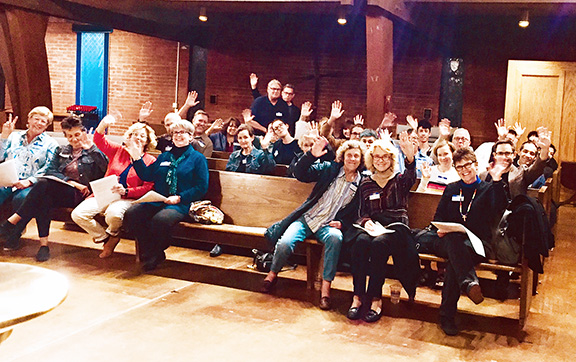
Welcome is the word and the image conveyed by St. Paul’s friendly congregation. Photo: Kay Sylvester
At “The Welcome Table” communion begins with conversation and a light meal; worship happens later.
Several dozen Southland Episcopalians gather for the alternative service Oct. 3 at St. Paul’s Church in Tustin, wearing “icebreaker” tags bearing their names, favored personal pronouns and favorite musical artists.
Michael, 18, a Lady Gaga fan and a Welcome Table regular, brought a friend, Jonah, for the first time. “I come here because I’m gay,” Michael, a college student, told the Episcopal News. “For so long, it seems as if churches have not been welcoming. But to have an entire denomination, the Episcopal Church, welcome us, and now, for St. Paul’s to offer this, it is empowering and validating.”
Jonah, also 18 and a local college student, agreed. “This is very different from my own church,” he said. “It seems that for some churches you cannot be religious and be LGBTQ. Some churches are not accepting of LGBTQ community. That everyone here is so accepting is an amazing thing.”
They represent a community GLEAM-OC was hoping to reach when launching The Welcome Table in April 2018, according to the Rev. Kay Sylvester, St. Paul’s rector.
“We wanted to broaden our ministry to the LGBTQ and friends community, and especially to support younger folks,” said Sylvester, chair of GLEAM-OC, the Orange County chapter of Gathering LGBT Episcopalians in Active Ministry.
The congregation gathers at about 6:30 p.m. for a potluck, buffet-style meal. Served up this evening is pumpkin bisque, created by the Rev. David Milligan, St. Paul’s associate rector, who doubles as preacher and musician for the evening worship.
‘The Lord’s Supper in three courses’
The bell rings at 7 p.m. and the gathering moves to adjacent pews for a moment of silent meditation before the start of the liturgy, created by Sylvester.
The Welcome Table’s three-fold movement was inspired by Holy Spirit, Silver Lake’s offering of “the Lord’s Supper in three courses”: food and fellowship; a contemporary Eucharist and then dessert and more fellowship. Holy Spirit, a progressive, diverse, inclusive community committed to hospitality, worship and service, meets Thursday evenings at the Chapel of St. Francis in Los Angeles.
At this meeting in Tustin, Milligan tackles the difficult divorce question put to Jesus by the Pharisees in Mark 10:2-16, from the Sunday, Oct. 7 lectionary, saying, “Jesus is always about the business of restoration.”
But Jesus told them, “It was because of your hardness of heart that he wrote this command for you. But from the beginning of creation, ‘God made them male and female.’ That’s why ‘a man will leave his father and mother and be united with his wife, and the two will become one flesh.’ So they’re no longer two, but one flesh. Therefore, what God has joined together, man must never separate” (New International Version).
Jesus’ reply, Milligan says, “severs the jugular” of the religious authorities’ belief that men were recipients of God-given authority over women. Jesus accomplished this by quoting to them their own Scriptures. In short, he said, “Jesus’ answer placed women on equal footing and with equal responsibilities as men.”
The passage is about much more than sex, Milligan added. “The word translated “adultery” speaks to damage done from a relationship being broken apart,” he said. “It speaks to brokenness, unfaithfulness, betrayal. That might include sexual behavior but certainly is not limited to it and we are not well-served by this narrow interpretation.”
Jesus’ reply is a “mandate to protect the vulnerable … a call to equality … an invitation to faithfulness,” he told the gathering.
“It is a caution against damaging relationships in a way that leads to permanent scars. What this is not is a Scripture about who can and cannot be married. It is a Scripture that calls us to a more meaningful engagement with our partners.”
After worship and opportunities for healing prayer, dessert is served up, along with time for reflection.
‘This place is for you’
The Welcome Table is “an incredible model of creating loving community,” according to the Rev. Christopher Montella, who presided over the Eucharist. “It really is quite simple. Open the doors. Invite people in. Go out to them, offer nourishment, spiritual or literal.”
Montella, an associate rector at St. Wilfrid of York, Huntington Beach, and chair of the Bishop’s Commission on LGBT Ministries, said: “We need to do all we can to create safe spaces for young people, to explore what it means when they walk in a space like this, for us to say, ‘this place is for you.’”
“We need to welcome them to the table, where hungry people get fed, particularly in a time when life for LGBTQ persons seems a battle … when there’s still so much hate and judgment out there.”
The Rev. Carole Horton Howe, associate rector at St. Matthias, Whittier, said it was a joy to serve as deacon at worship, “to be involved in a liturgy so beautiful, so welcoming. It is very warm, very accepting, very filled with love, the love God meant for us to have for one another is here.”
Bonnie, an East Coast transplant who lives in Costa Mesa, heard about the gathering from a friend. Standing with others at high-top, black-clothed tables beside the sanctuary, she said she will attend The Welcome Table again because “I’m looking for connection, for community.”
To learn more about The Welcome Table, email to stpaul@stpauls.org.
